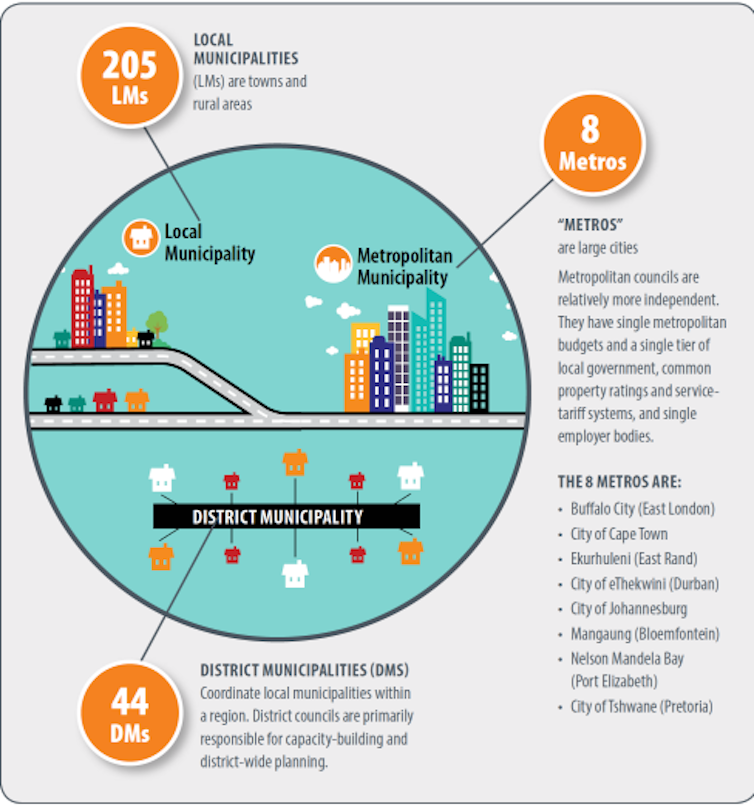Local economic development and the provision of better municipal services are essential if South Africa is to increase economic participation and reverse unemployment trends.
To achieve these goals, local government finances and investments need to be strengthened. Good local government governance is a prerequisite. As urban development is critical to growth and investment, intermediate city municipalities have an important role to play. It could also reduce pressure on metros due to urbanization.
Local governments must:
-
Provide democratic and responsible governance for local communities
-
Ensuring that we deliver our services in a sustainable manner
-
Promote social and economic development and a safe and healthy environment
-
Encourage community involvement in local government issues.
Current results suggest that South African local governments are failing in many of these respects.
The impact on this country is dire and far-reaching. Bankruptcies of local governments do not only affect large corporations. It also affects households, MSMEs, and other investors in the local economy.
Economic growth, job creation, and local economic development efforts depend on local government finances. If local governments do not function well, they will be constrained. Households are directly affected by inadequate provision of basic services. But the problem extends beyond the household level.
Local governments must provide infrastructure and basic services that support a favorable investment environment. Without this investment, unemployment and poverty could become even deeper. This has the further effect of eroding the local tax base and increasing the dependence of local governments on fiscal transfers, worsening South Africa's already constrained fiscal environment.
ripple effect
Two examples illustrate how municipal failure can have a direct negative impact on local economic development.
The first is Clover, a food and beverage company. The company has announced that it will close its cheese processing facility in Lichtenburg, Northwestern Region. Production will be transferred to an existing factory on the outskirts of Durban, KwaZulu-Natal.
The company attributed the decision to ongoing problems with service delivery by the Ditsobotla municipality. He specifically mentioned water outages, power outages, and poor road quality. It is estimated that 330 jobs will be lost in the Liechtenburg economy as a result of this measure.
Another example is Astral Foods, one of the largest chicken producers in South Africa. The company owns a processing plant in Standerton, Lekwa. Astral has taken legal action against the municipality due to severe supply disruptions due to infrastructure collapse. Power outages and water shortages reportedly cost the company around R62 million in losses in its latest financial year.
The court ordered the municipality to submit a long-term plan for infrastructure repair and improvement.
However, this did not improve the results. A new court order was issued earlier this year. This required the central government and the Ministry of Finance to intervene and create a fiscal reconstruction plan.
scale of the problem
We set out to better understand the extent of municipal failure in different types of municipalities. In our research notes, we drew comparisons between large cities, intermediate urban municipalities, and other municipalities.
The population density, potential economic activity, and resource base of intermediate urban municipalities suggest that good local governments can exploit significant economic opportunities in these locations.

Bureau of Economic Research/The state of South African cities, 2016
Creating economic opportunities in intermediate urban municipalities may also alleviate some of the service delivery pressures caused by urbanization into metropolitan areas. It may help create a less skewed spatial distribution of economic activity and opportunity.
It is important to remember that local authorities have different service delivery responsibilities across rural and urban areas. They face different opportunities in terms of access to revenue. Therefore, not everyone faces the same set of challenges.
Additionally, local governments form part of the broader structure of government. Therefore, they are interdependent on the functioning of national, state, and local governments. It also needs institutions such as the electricity company Eskom and the water board to function properly. Local governments cannot influence local economic development in isolation from these actors.
Our research note identifies several cross-cutting issues in the South African local government sector.
Focusing on service delivery, we explain how problems in supply chain management and audit processes can lead to poor or non-delivery of basic services. We will also highlight some financial performance indicators that contribute to poor results. Examples include low spending on repairs and maintenance and inadequate debt recovery rates.
Finally, the vacancy rate is high. And there is also a lack of ability. Political influence and interference in the appointment of administrators and other municipal officials contributes to the problem.
solution
It is important to check whether the professional has the necessary qualifications.
It might be helpful if municipal managers were required to register with professional bodies. It may also help to ensure that appointments are made on merit and without undue political influence. This is particularly important in local government departments.
Mechanisms for sanctioning or removing local government employees from office if their performance is consistently poor could also contribute to better outcomes.
Supply chain management and audit processes must prevent fraud and corruption. But it shouldn't deter you from spending. Nor should the focus shift away from core local government functions. The need to find less cumbersome supply chain management processes is critical. This should focus on increasing accountability for financial management and service delivery. It doesn't just focus on compliance details and post-mortem audit interrogations.
Regulatory systems need to strengthen, not paralyze, service delivery.
The complex development issues facing South Africa cannot be solved by local governments operating in isolation.
Inter-jurisdictional cooperation between players needs to be better managed. These include local authorities, water boards, provinces, Eskom and national departments.
Public-private partnerships can also provide valuable opportunities. These may, for example, help us manage, expand, maintain and improve the operation of some revenue-generating components of our service offering. Water, sanitation, and solid waste management come to mind.
However, not all municipalities have the skills to manage such projects. Many may need technical support. These efforts should be carefully planned and not be the result of insufficient capacity or skills within the municipality. These considerations may contribute to better outcomes and improved service delivery.
The important development role that intermediate city municipalities can play in creating jobs and stimulating economic growth suggests that these areas should be given particular priority.
This article is an excerpt from South Africa's Local Government Challenges and Their Impact on Regional Economic Development, a research note published by the Department of Economic Research at Stellenbosch University.

